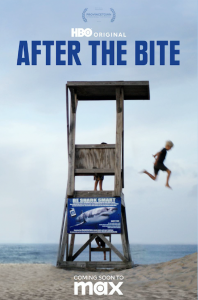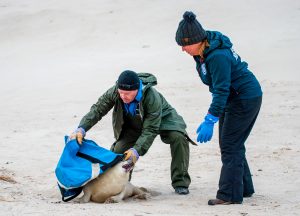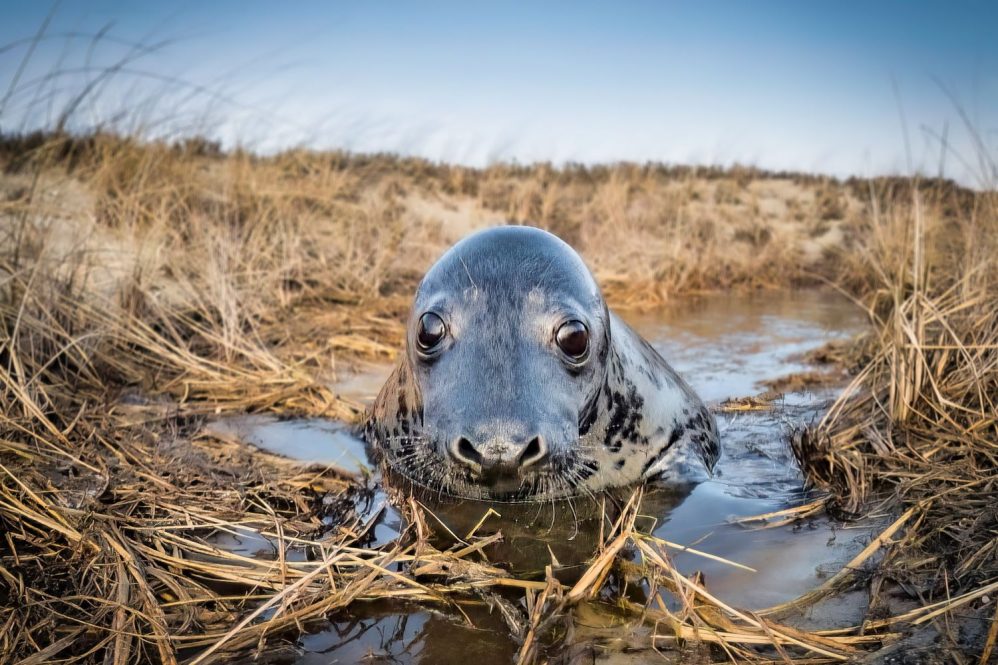Milton Levin ’04 (CAHNR) spends part of every year wrangling grey seal pups to study infectious diseases in their population.
This year, the public will get a glimpse of the work Levin, an associate research professor in the College of Agriculture, Health and Natural Resources, does through footage he contributed to an upcoming HBO documentary.
“After the Bite,” directed by Ivy Meeropol, focuses on the interactions between people, sharks, and seals in the waters around Cape Cod, Massachusetts.

Meeropol, who is from Massachusetts, wanted to create a film focusing on the Cape’s shifting ecosystem as great white sharks – and human encounters with them – have become more common in recent years.
Levin, who is an associate research professor in the Department of Pathobiology and Veterinary Science, and his collaborators have been working with grey seals in the waters around Muskeget Island and Monomoy National Wildlife Refuge, for over a decade.
Seals can contract diseases that also affect humans like influenza and COVID-19. And scientists want to better understand how infectious diseases impact these animals and how they spread.
“We’re trying to understand how these pathogens circulate through the ecosystem,” Levin says.
Levin’s group evaluates if there is a connection between exposure to contaminants, like PCBs (polychlorinated biphenyls) and PFAS (polyfluoroalkyl substances), and immune functions in grey seal pups.
Meeropol interviewed Levin’s colleague, Wendy Puryear, a researcher at Tufts University, about the group’s research for the documentary.
When Meeropol and her team were unable to obtain permits to film the researchers at work, she asked Levin if he could provide footage for the film.
Levin routinely collects photos and videos to document his team’s work. He sometimes uses them in talks or to show new team members what they can expect out in the field.
“I don’t make a lot of that public,” Levin says. “I usually just keep it in the academic setting, so it was nice to see it on the big screen.”
In January 2022, Levin and his team went out to Monomoy to conduct their annual field work.
“We went out and we did our research as we normally do, but we put a little more effort in to filming what we do,” Levin says.

Due to COVID restrictions, the team only had five researchers, as opposed to their usual 10. This created a challenge as Levin was trying to capture high-quality footage.
“My priority was to make sure everything was safe for everybody,” Levin says. “Because I mostly handle the seals, my attention had to be on the seals.”
Meeropol sent Levin and his team an early cut of the clip including the interview with Puryear and Levin’s footage.
“Almost everything we saw in the initial edit made it into the final film, so we were all excited about that,” Levin says.
Levin and the other researchers attended the film’s premiere at the Provincetown Film Festival in June.
“I don’t think a lot of people understand the science with the seals,” Levin says. “And I think [Meeropol] did a good job of highlighting that there’s a lot of science going in to understanding seal health, which is reflective of ecosystem health.”
“After the Bite” will premiere July 26 on Max, HBO’s streaming service.
This work relates to CAHNR’s Strategic Vision area focused on Fostering Sustainable Landscapes at the Urban-Rural Interface.
Follow UConn CAHNR on social media



